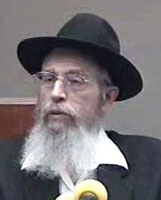- Torah Portion and Tanach
- Beha'alotcha
37
Our Sedra is known as Parshat Hamit’lon’nim, of the Complainers. Our downward spiral as a nation from an exalted People who received the Torah directly from G-d, to a wandering generation destined to die out in the desert, began with our grousing. We kvetched about the hardships of traveling in the desert; about the lack of meat & water; even about the miraculous Mahn that fell from the heavens & had any taste imaginable.
Moshe, our loyal defense attorney, tries to present our case in a positive light. He refers to us being "on foot," hinting to G-d that walking through the brutal desert was no simple thing & we could be excused for bemoaning our hardship. He says "asher Anochi b’kirbo;" literally, Anochi (i.e. Hashem) is still among the nation, that when all is said & done, we still are a holy, G-dly people.
But Moshe is also stressing - by saying "Asher anochi b'kirbo - and I am among the nation" - that he is but a part of the general community of Am Yisrael. I want to elaborate on this simple yet sublime sentence.
When Bnei Yisrael complain about the desert fare, about what they miss most from their days in Egypt, they davka single out 5 specific foods: cucumbers, leeks, onions, garlic & watermelon. What do these 5 have in common? Rashi says that these foods are dangerous for nursing mothers. And so, although the Mahn could taste like whatever food one imagined, it could not taste like these 5 items, so as not to bring harm to the nursing women.
Asks the Lubavitcher Rebbe: Why deny the entire nation these foods, if they negatively affected only a minority? Why not just prevent the Mahn from tasting like these foods for only the nursing mothers, but not for everyone else?
He answers: The nursing mothers, who are nurturing the new generation that will enter Israel, might be distressed to see others eating those foods which they desire, yet cannot eat. So, to empathize with their feelings, all the people must sacrifice their enjoyment of those things.
A true leader, like Moshe, is sensitive to the needs of everyone, not just himself. He lets it be known that he will not enjoy any special privileges or protected position that is denied his people. He may be the leader, but he is still one of us. Indeed, it was his very insistence on being one of us - when he left the Egyptian palace to "join his brothers" - that qualified him to be our leader in the first place!
Leaders, present or future, are you listening??

Blow When You Are Happy
Rabbi Daniel Mann | Sivan 10 5776

Ask the rabbi: was moshe’s wife tzipora black?
Rabbi Stewart Weiss | 20 Sivan 5784

It’s a "50-50" proposition
Rabbi Stewart Weiss | 20 Sivan 5784

Power or Influence?
Rabbi Jonathan Sacks | Sivan 16 5781

Receiving Torah Like Children
Rabbi David Dov Levanon | Shavuot 5760

Mourning Customs During the Omer
Rabbi Eliezer Melamed | 5764

Far More than 13 Million
Rabbi Eliezer Melamed | Av 21 5775

Mourning Customs During the Omer
Rabbi Eliezer Melamed | 5764

The Yom HaZIKARON SIREN- EVERY ARROW NEEDS A HEAD!
Rabbi Ari Shvat | Iyar 5785






